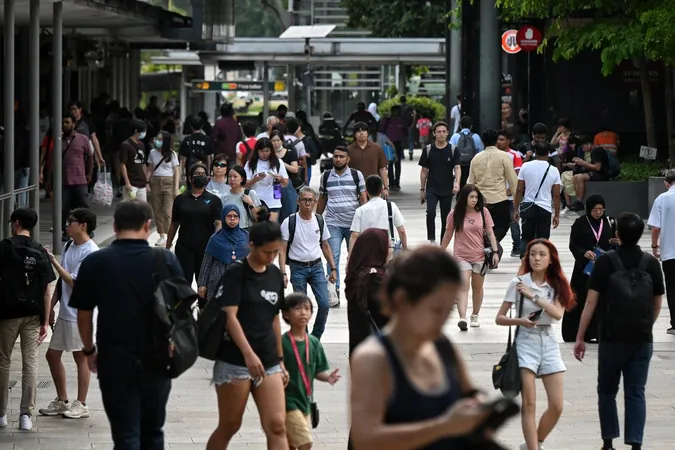
Groundbreaking New Bill in Singapore Aims to Solidify Racial Harmony Amidst Growing Concerns
2025-01-07
Author: Mei
Groundbreaking New Bill in Singapore Aims to Solidify Racial Harmony Amidst Growing Concerns
SINGAPORE – On January 7, Singapore's Parliament saw the introduction of a pivotal Bill aimed at consolidating and empowering the Government's capabilities to uphold racial harmony in the city-state.
The proposed Maintenance of Racial Harmony Bill would designate various clan and business associations tied to the Chinese, Malay, and Indian communities as 'race-based entities.' This classification would bring around 300 organizations under a framework designed to minimize foreign influence, as stated by the Ministry of Home Affairs (MHA).
Under the Bill, these race-based entities would be required to publicly disclose their foreign affiliations, anonymous donations, and the composition of their leadership teams. Furthermore, more than half of the governing body members must be Singapore citizens, ensuring that the interests of the local populace are prioritized.
One of the Bill's central features is the power it grants to the Minister for Home Affairs to issue restraining orders against individuals engaged in producing or disseminating content deemed detrimental to racial harmony. This is akin to the protections established under the Maintenance of Religious Harmony Act (MRHA), and serves as a pre-emptive measure against the spread of discord.
Notably, while the MRHA has never seen the actualization of a restraining order since its inception in 1990, this legislation aims to bridge the gap in proactive measures against harmful racial content. Violations of such orders could lead to imprisonment for up to two years and fines reaching $10,000, creating a significant deterrent for potential offenders.
Developed over three years, the Bill was first proposed by former Prime Minister Lee Hsien Loong during his 2021 National Day Rally speech, underlining the importance of both racial and religious harmony in maintaining societal stability.
Interestingly, the MHA revealed that a government poll conducted in August 2024 with over 1,000 respondents indicated strong support for heightened governmental protection of racial harmony. Approximately 61% of participants believed that the Government should take more decisive action, with 55% advocating for community remedial measures in lieu of prosecution for less severe race-related offenses.
The Bill also introduces a community remedial regime, allowing offenders the opportunity to rectify their harmful actions without facing criminal charges. Successful completion of such programs could influence the decision on whether to proceed with prosecution for race-related infractions.
Additionally, the Bill amends how racial offenses are defined, shifting the language from 'wound racial feelings' to 'insults, vilifies, denigrates, threatens, or abuses on the basis of race.' The maximum penalties for these offenses would increase from three to five years, reflecting a tougher stance on such misconduct.
An important distinction in the Bill is its focus solely on designated race-based organisations, setting it apart from the MRHA—which encompasses all religious groups. The MHA acknowledged that this targeted approach is practical and necessary to manage the considerable scale of potential malign influences on racial harmony.
Concerns have been voiced regarding whether the Bill might inhibit open discussions on race due to potential repercussions. However, the MHA assured that robust safeguards, paralleling those in the MRHA, will be instituted to protect genuine discourse.
A new entity, the Presidential Council for Racial and Religious Harmony, is proposed as part of the Bill to replace the existing council, with a diversified membership representing Singapore's rich tapestry of communities.
Furthermore, the Bill allows for defenses around private conversations and good-faith discussions about race, essentially providing citizens the assurance that they can engage in dialogues without fear of reprisal, as long as they are responsible and constructive.
While the Government emphasizes its commitment to nurturing a discourse that fosters understanding and responsible engagement, it has made it clear that any speech or actions that threaten racial harmony will face strict repercussions.
As Singapore navigates its layered racial dynamics, this Bill signifies a critical alignment of legal frameworks to safeguard social integrity and underscore the nation's commitment to multicultural coexistence. Stay tuned as this legislation unfolds and shapes the future of racial relations in Singapore!

 Brasil (PT)
Brasil (PT)
 Canada (EN)
Canada (EN)
 Chile (ES)
Chile (ES)
 España (ES)
España (ES)
 France (FR)
France (FR)
 Hong Kong (EN)
Hong Kong (EN)
 Italia (IT)
Italia (IT)
 日本 (JA)
日本 (JA)
 Magyarország (HU)
Magyarország (HU)
 Norge (NO)
Norge (NO)
 Polska (PL)
Polska (PL)
 Schweiz (DE)
Schweiz (DE)
 Singapore (EN)
Singapore (EN)
 Sverige (SV)
Sverige (SV)
 Suomi (FI)
Suomi (FI)
 Türkiye (TR)
Türkiye (TR)